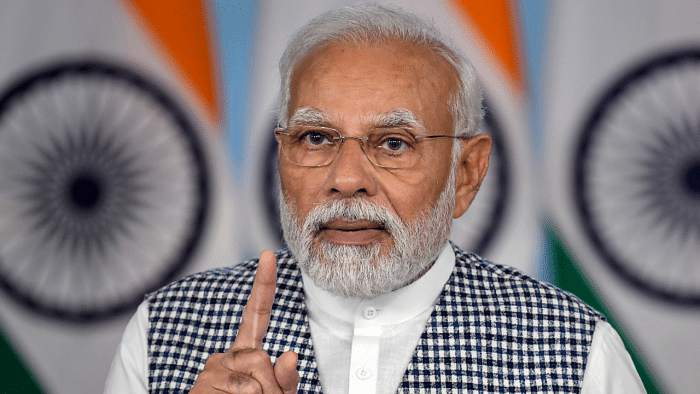
Prime Minister Narendra Modi on Friday mooted the idea of 'One Nation, One Police Uniform', saying he is not trying to impose it on states though he thinks the identity of the police across the country could be identical.
Modi made the remarks while digitally addressing the 'Chintan Shivir' of state Home Ministers in Haryana's Surajkund during which he also emphasised the need for close cooperation among the states to tackle crimes and criminals.
He also said the laws enacted by the Centre "clearly" shows that there is a will to strongly handle corruption, terrorism and hawala and that laws like UAPA have given strength to the system in a decisive battle against terrorism.
"The 'One Nation, One Uniform' for police is just an idea. I am not trying to impose it on you. Just give it a thought. It may happen, it may happen in 5, 50, or 100 years. Just think over it," Modi said, adding that the identity of police could be identical across the country.
He said this would not only ensure quality products due to the scale but also will give a common identity to law enforcement as citizens will recognise police personnel anywhere in the country. States can have their number or insignia, he added.
In his nearly 45-minute video address, the Prime Minister also referred to Naxals "with guns or the one with pens" and said they have to be "uprooted to prevent them from misleading the youth of the country".
Warning that such forces were "increasing their intellectual sphere to pervert the minds of coming generations", Modi said such forces get significant help internationally and India cannot allow any such forces to flourish in our country.
He said the reform measures taken by the government in the past few years have helped in strengthening the law and order system and maintaining a peaceful environment in the country.
“Maintaining law and order is a 24X7 job. It is necessary to work towards advancements and improvements in the processes involved," he said while noting that decriminalisation of several provisions in the Company Law was such a step in this direction. He asked the states to evaluate and get rid of outdated rules and laws.
Batting for mutual cooperation between states, he said crime is no longer localised and instances of interstate, international crimes are going up.
"That is why mutual cooperation between state agencies and between central and state agencies is becoming crucial. Whether it is cybercrime or the use of drone technologies for the smuggling of weapons or drugs, the government needs to keep working towards new technologies to tackle the menace. The law and order system can be improved with the help of smart technology," he said.
Referring to the introduction of 5G technology, he said, while it brings benefits, one should also be aware of the challenges and emphasised that there is a need for heightened alert.
Against this backdrop, Modi asked Chief Ministers and Home Ministers to seriously assess the need for technology, going beyond the constraints of the budget as this technology will percolate the confidence of security among common citizens. "We should have a pan India outlook, all our best practices should be interoperable and should have a common link," he said.
Warning about the pitfalls of social media, he said a piece of single fake news has the capability to snowball into a matter of national concern.
Lamenting the losses that India had to face due to fake news about job reservations in the past, he said there is a need to educate people about analysing and verifying any piece of information before forwarding it to people. "We have to come up with technological advancement to prevent the spreading of fake news," Modi said.
Modi also said even though law and order are the responsibility of the states as per the Constitution, they are equally related to the unity and integrity of the country.
"Every state should learn from each other, take inspiration from each other, work for the betterment of the country, this is the spirit of the constitution and it is also our responsibility towards the countrymen," he added.
Emphasising the link between the law and order system and the development of the states, he said, "it is very important for the entire law and order system to be reliable. Its trust and perception among the public are very important."
